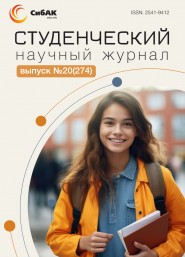Статья опубликована в рамках: Научного журнала «Студенческий» № 20(274)
Рубрика журнала: Психология
Скачать книгу(-и): скачать журнал часть 1, скачать журнал часть 2, скачать журнал часть 3, скачать журнал часть 4, скачать журнал часть 5, скачать журнал часть 6, скачать журнал часть 7, скачать журнал часть 8, скачать журнал часть 9, скачать журнал часть 10, скачать журнал часть 11, скачать журнал часть 12
THE CORRELATION BETWEEN SELF-ESTEEM AND THE LEVEL OF PERSONAL ANXIETY AMONG STUDENTS IN ONLINE LEARNING
ABSTRACT
This article analyzes the results of a study of the relationship between self-esteem and the level of personal anxiety among students in online learning. It was found that a low level of self-esteem is directly correlated with a high level of anxiety among students.
Keywords: distance learning, psychological support, psychological adaptation, the impact of distance education, combating anxiety, increasing self-esteem.
The relevance of this study is due to the growing problem of low self-esteem among students in online learning, which leads to an increase in anxiety. The past COVID-19 pandemic, as well as modern circumstances in the face of a Special Military Operation, contribute to the development of online learning, but are unable to deal with the consequences of this form of education.
It is important to keep in mind that the student age is an extremely important stage in our lives. The online learning format is not something radically new in our country, this branch of education develops annually, which entails both negative and positive aspects, however, the most important negative aspect of this form of knowledge acquisition is the lack of live communication with peers and teachers.
One of the most important aspects of our lives is our own self-esteem. It plays an important role in shaping the well-being of students. In her research, L.V. Borozdina notes that at different ages people focus on different components of self-esteem [1]. Students are characterized by an ideal self-esteem. A person becomes a person as a result of interaction with others. Research confirms that the child's initial self-image is formed in the family. Gippenreiter emphasizes that in childhood a person learns about himself from the words and relationships of loved ones, forming an image of himself from the outside [2].
In modern scientific knowledge, the problem of anxiety occupies a special position. On the one hand, it is considered as the “central problem of modern civilization”, acting as an important feature of our time. On the other hand, anxiety can be studied as a mental state caused by specific experimental conditions or situations [3].
High levels of anxiety can affect students` academic and psychological well-being. Due to the lack of live contact with the teacher, students experience this very anxiety.
It is important to note that online learning is not a bad way of learning, however, the numerous negative effects that students experience do not allow the positive ascetics of such learning to hide the negative ones.
The study, organized on the basis of NCFU (North Caucasus Federal University), was attended by students aged 18 to 24 years, the total number of whom was 60 respondents. The Rosenberg self-esteem scale and the Spielberger-Hanin anxiety scale techniques were used.
Because of the study, it was revealed that 56.67% of students have low self-esteem, which statistically accounted for more than half of the participants. The lowest value was 5%, and a minority of respondents had an extremely high level of self-esteem. 46.67% of the surveyed students experience a high level of anxiety, and the number of students with a low indicator was 11.67% of the respondents.
The correlation analysis revealed a statistically significant relationship between self-esteem and the level of personal anxiety among students in online learning conditions.
Thus, our research has shown that self-esteem and personal anxiety have a connection with each other. Therefore, in order to increase self-esteem and reduce personal anxiety, it is necessary to carry out a number of works to improve online learning and support students who find themselves in similar conditions.
References:
- Adler A. To understand the nature of man / Trans. E.A.Tsypina. – St. Petersburg: "Academic project", 1997, 256 p.
- Ananyev B.G. Man as an object of knowledge. – St. Petersburg: Peter, 2001, 288 p.
- Ankudinova N.E. On the features of assessment and self–assessment of students in grades I – IV of educational activity // Questions of psychology, 1968, No. 3, pp. 131-138.
- Astapov V.M. A functional approach to the study of anxiety // Anxiety and anxiety. – St. Petersburg: Peter, 2001, 156 – 165 p.
- Borozdina L.V., Molchanova O.N. Self-esteem in the first maturity // Bulletin of Moscow State University. Ser.14, Psychology, 1990, No.2, pp.24-48.
- Gippenreiter Yu.B. Communicate with a child. How? - Moscow: AST : Astrel, 2007, 240 p.
- May R. Summary and synthesis of theories of anxiety // Anxiety and anxiety. – St. Petersburg: Peter, 2001, 215 – 223 p.


Оставить комментарий